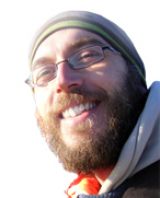Co-creation, democratized communication, co-written stories—and more. All of these are concepts Julian Stodd, co-captain of SeaSalt Learning uses to describe the new ecosystem he believes is the Social Age. Julian’s mission in life is to facilitate meaning and understanding in a new enterprise world. He sees a world where many, if not most, of the paradigms that used to shape and regulate the workplace have become redundant, overtaken by a new, fluid, and unexpected environment.

Figure 1:
Julian Stodd
So, “Why SeaSalt?" I asked Julian. He says, “The simple answer is that we all live by the sea, but it's far more than that. SeaSalt is about exploration, questing, questioning, and curiosity in the Social Age. Our new world is global, and the concepts of ports and harbors at stopping points on the journey provide great illumination of the changing world. We are not a hierarchy, we are a community, sailing together—a true crew, dependent on each other for performance and insight.”
So what is this new paradigm that Julian perceives? “Learning is situated in the workplace. Tribal knowledge is owned by the community. Even in the case of a formal learning program or a cycle of an online blended approach (such as an on-boarding campaign), evolution occurs through community interaction. To be engaging in this space, we have to revisit our core approaches to design, moving towards more scaffolded, co-creative approaches.”
That idea fundamentally challenges our traditional views of organizations, governed and regulated through hierarchy, structures, rules, and a fundamental direction of the enterprise through organizational power. The social authority that Julian now sees as the norm is contextual and consensual: granted and moderated by the community, not a hierarchy of power. It is fundamentally about reputation—created through humility, storytelling, and sharing. ”Knowledge is power” is an extinct idea. Life now is about doing something meaningful with the knowledge freely available and curated in our communities.
Trends Julian perceives in learning are rooted in the removal of a separation of learning from work. The dismantling of the “geo” barriers as we are able to access learning 24/7, and the dispersal of knowledge from centralized corporate repositories into multiple portals, platforms, and global warehouses is responding to the workplace imperative of seemingly always needing to do things differently tomorrow.
But our enterprises still predominantly retain their traditional shape—even SeaSalt has a Captain! So how does this work? Julian believes that social leaders have a need to add to the traditional skill set, recognizing that their power comes from embracing the behaviors demanded by a community-driven culture. There is a need in leadership to embody both formal and social authority.
Surely this breakdown of the power of the hierarchy is threatening to many leaders? Julian: “Yes, of course there are anxieties about the implications of sharing and openness, but I am finding that leaders are now recognizing the social conversations that are going on both within their organizations and also with the wider world—regardless of whether they are engaged or not. Remaining isolated is a failure that will lead to extinction.”
Julian has a model of change and engagement that is centered around co-creation of the story of the enterprise. “The NET model (narrative, engagement, and technology) has the space to carry a more ‘traditional’ top leadership with it for those who have invested in change and the status quo.” For those showing authenticity in the light of the enterprise community, the “magnetic alignment” of the enterprise, evolved into a community of social authority, provides a real opportunity for leaders to develop a new power and authority that is community based.
Julian asserts, “Social authority, by its speed, fluidity, and acceptance of peer knowledge, subverts slower moving, unresponsive hierarchical authority. Not being engaged is not an option. The challenge is trying to sub-contract the story throughout the organization—creating a new and authentic story.”
“Surely the change that you now see as pervasive is simply a matter of the changing of the generations in leadership?” I asked Julian. He said, “I disagree! The ecosystem we live in has changed. The response to the new environmental pressures must be felt throughout the height and breadth of the organization. It is about co-created and co-owned change at every level. People will be loyal if we earn that loyalty. People will engage if we make learning engaging. People will stay with us if we are fair and kind.”
Challenging stuff!
You can follow Julian Stodd at www.julianstodd.wordpress.com.



